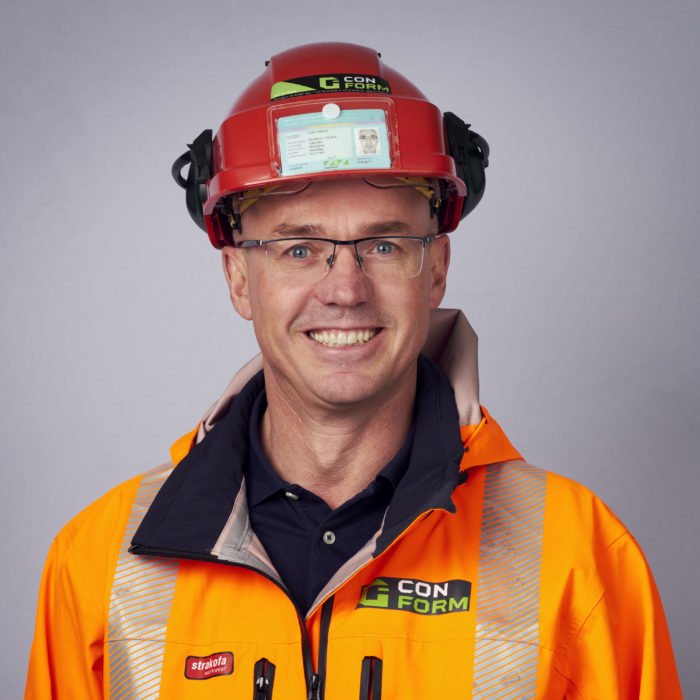Digital transformation
Con-Form; a digital transformation journey in the construction industry
No legacy
still use the same apps as 10 years ago
ERP system
tailored to Con-Forms needs
Innovate
test new applications
Intro
The Nordic construction market for residential buildings and hotels has been growing rapidly. With a unique solution for producing building envelopes to this market, Con-Form has experienced a continuously increasing demand for their services – pushing them to quickly expand their operations. However, as the company relied heavily on manual processes governed by distributed spreadsheets and paper-based reports, further growth imposed a risk of losing control over information and processes.
To relieve the situation, Con-Form chose to go no-code with Genus for a digital transformation journey. By incrementally and rapidly implementing support for core processes and data structures into the platform, Con-Form has in effect built and evolved its own specialized ERP system tailored to its specific needs.
“The flexibility of Genus has enabled us to adopt best practices along the way, and we find it surprisingly easy to make changes.”
-Tom Erik Heggedal, CEO at Con-Form
-
Replaced manual, spreadsheet-based processes with a unified no-code ERP system using Genus.
Built and evolved their own tailored ERP system, enabling rapid implementation of new features and changes.
Enhanced efficiency and control, supporting continuous growth and innovation in the construction industry.
Challenge
A solid value proposition meets a growing construction market
Established in 1982, Con-Form has grown to become a leading provider of building envelopes in the Nordic construction industry. Their deliveries consist of the casting of foundations as well as casting and assembly of the structural work. With a unique combination of on-site casting and pre-cast frames produced in factories, Con-Form offers a more effective building process with significantly reduced risk – saving time, resources, and money.
In a rapidly growing market for residential buildings and hotels in the region, Con-Form experienced an increasing demand for its services. In order to scale to meet this demand, they realized that they had to make significant changes to both processes and the supporting technology.

Facing the limits of manual processes
The construction industry has a reputation for falling behind when it comes to digital transformation. Back in 2006, many of the processes in Con-Form were governed by submission and review of printed paper reports or spreadsheets sent by e-mail across personal computers. In addition, the lack of technical infrastructure on building sites often meant that paper-based solutions were the only possible way to manage projects.
“Before the arrival of 3G in Norway in 2005, the lack of internet infrastructure made it unfeasible to implement digital solutions for companies working on construction sites or in large factories,” said Bjørn Ole Rasmussen, Technical Manager at Con-Form.
To Con-Form, facing rapid growth meant an increased risk of losing control over their data and processes. Each project manager relied on their own self-designed spreadsheets and documents to stay in control of their projects. Further, the resource allocation team requested project managers to frequently report their resource demands. The spreadsheets they received were in varying formats, sent by e-mail, and subsequently combined in new resource-planning spreadsheets. Each and every spreadsheet throughout the organization represented a potential source of error, and the manual processes were labor-intensive and cumbersome.
“We could not continue our growth without new digital systems supporting our processes,” said Tom Erik Heggedal, CEO at Con-Form. “Between 2006 and 2008 our revenues doubled, and the overhead and risks we saw in our manual handling of spreadsheets were simply not acceptable.”
Solution
Starting a digital transformation journey
With the emergence of the viable mobile internet infrastructure, Con-Form realized that it was the right time to start its digital transformation journey. The starting point was a solution to collect project prognosis from all project managers and use this information for resource planning. However, as a growing and ambitious company, they also wanted to invest in a platform that supported an incremental implementation of functionality that they knew would become important further down the line. This included system support for improved financial reporting, project change management, customer relationship management (CRM), and health, security, and environment (HSE).
At first, Con-Form went to the market for commercial off-the-shelf products (packaged solutions) as they hoped this would mean a faster way to reach their goals. Unfortunately, they soon experienced that not only did these products not support their current needs in a satisfactory manner, they also seemed too rigid – meaning that Con-Form would need a suite of integrated systems in order to meet their ambitions.
“We wanted to keep all the data connected and centralized in one system,“ said Tom Erik Heggedal. “We also wanted a flexible system that could adapt to our own processes, rather than a rigid system stalling our business agility and our development as a company. Off-the-shelf software did not offer what we currently needed, and they were not able to change in the pace that we were changing.”
Con-Form then came across Genus, a technology that would later be known as a “no-code application development platform”. What Genus promised was a development platform where Con-Form could implement its own processes and data structures, as well as the ability to rapidly implement new features and changes when needed. Con-Form felt confident that Genus would be an enabler for further growth.
“Our vision was to build one single system for core operations in which all employees could cooperate. We wanted to avoid storing the same data in several places and needed to ensure that our people across regions were using the same processes. The flexibility of Genus has enabled us to adopt best practices along the way, and we find it surprisingly easy to make changes,” said Heggedal.
Result
Reaping the benefits of no-code
Following the launch of an initial solution supporting the resource planning process, Con-Form soon realized that it could use the Genus platform to rapidly support new cases of process improvements and innovations as they emerged. Along the way, the solution continued to add functionality to support new areas of core business operations, and it soon became the central ERP system for Con-Form.
“What we have ended up doing, is to build our own ERP system tailored to our specific needs,” said Eirik Heilmann, Business Controller. “The way we did it was by incrementally implementing smaller changes and process innovations as we needed new capabilities. The swiftness and flexibility of Genus have enabled us to try out many new process improvements and keep only those that have proven to deliver value. We are still using the same system as we did more than a decade ago, but it has neither a technological nor functional legacy. Genus ensures that the technology and user experience are up-to-date, and we ensure that the business functionality of the system is continuously improved in pace with our organization.”
In 2024, Con-Form is still using Genus as their platform for ERP and core operations. New functionality is rapidly implemented when needed, supporting an innovative company in continuous growth.
About ConForm
Con-Form is a leading provider of building envelopes based on prefabricated concrete elements for the apartment and hotel construction markets in Norway and Sweden. The company has six factories and close to 500 employees in the region.






